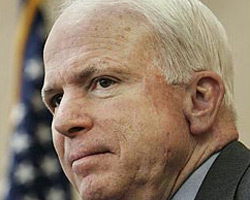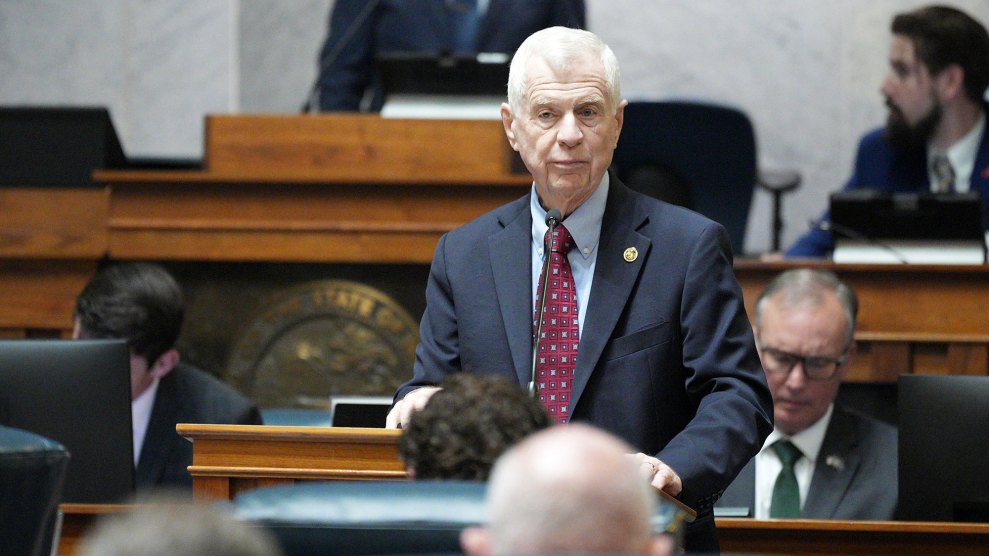
As one of the leading critics of Washington’s quid pro quo culture, John McCain has not just denounced the influence lobbyists have over policy and the legislators who make it. He has repeatedly bashed the “revolving door” through which government officials move from federal jobs overseeing an industry to high-paying private positions repping for that same sector—and vice versa. He has supported legislation that would strengthen lobbying restrictions on former members of the Executive Branch, former Members of Congress, and former congressional staff. On his campaign website, McCain declares that he “has fought the ‘revolving door’ by which lawmakers and other influential officials leave their posts and become lobbyists for the special interests they have aided.”
Yet, McCain’s offices have been part of the revolving door culture. Mother Jones conducted a review of lobbying disclosure forms and publicly available information at OpenSecrets.org and Legistorm.com. The records show that since the Keating Five scandal, which by McCain’s own account turned the Arizona senator into a crusader for reform, at least 20 McCain staffers—working for McCain’s personal Senate office or for one of the committees he has chaired—either came to McCain’s employ from a lobby shop or joined one after leaving the congressional payroll.
It is common practice for congressional aides from both parties to head to lucrative lobbying positions after working on Capitol Hill. And often lawmakers themselves leave Congress and return to lobby their former colleagues. But McCain has a special lobbyist problem. It’s not just that his presidential campaign has been managed by former lobbyists for corporations and foreign governments. (Though several lobbyists have recently left his campaign, McCain’s two closest aides—Charlie Black and Rick Davis—used to be top-tier lobbyists.) McCain has surrounded himself with lobbyists and lobbyists-to-be, all while positioning himself as the revolving door’s top critic. McCain vows that if he’s elected he’ll change the revolving door culture of Washington. But if he can’t do so in his own outfit, how can he do so for the entire town?
Below are several case studies demonstrating how the revolving door has worked at McCain’s Capitol Hill offices:
Currently the head of John McCain’s Senate office, Mark Buse started working as one of McCain’s legislative assistants in 1987. He went on the serve as staff director for the Senate Commerce Committee from 1997 to 2001, when McCain was the committee’s chairman. From there, Buse decamped to the law firm Mintz Levin and its affiliate ML Strategies, where he spent six years lobbying for financial services companies, pharmaceutical firms, telecoms, oil and gas interests, and other corporate clients. Apparently, Buse’s trip through the revolving door didn’t taint him in McCain’s eyes. In 2007, McCain hired him to be his Senate chief of staff.
Buse wasn’t the first McCain chief of staff to take this route. Christopher Koch headed McCain’s office from 1987 to 1990. He then spent three years as the chairman of the Federal Maritime Commission, an independent federal agency that regulates America’s ocean-based commerce. He left the commission to spend the majority of the ’90s lobbying for the shipping industry and in 2000 became the president of the World Shipping Council, the industry’s trade group in Washington. Early this month he announced that he would be taking a temporary leave of absence to work as the policy coordinator for the McCain campaign.
Paul Martino took over as Republican counsel for the Senate Commerce Committee in June 2001. In 2005, when the committee chairmanship transferred from McCain to Senator Ted Stevens, Martino left to lobby for Alston & Byrd, where he now advances the agendas of clients as diverse as Goodyear and the Coalition Against Domain Name Abuse. Martino touts his connection to McCain on Alston & Byrd’s website, and he currently serves as a fundraiser for McCain’s presidential campaign.
Then there’s former McCain staffer Mary Phillips, currently an official at the Federal Highway Administration. Prior to arriving in Washington, Phillips held a number of positions within the railroad industry. From 2002 to 2004, Phillips served on McCain’s commerce committee staff, advising him “on surface transportation matters, including Amtrak policy,” according to her bio on FHWA’s website. She left McCain’s staff to become vice president for legislative affairs for the American Trucking Association, lobbying for the trucking industry on Capitol Hill. Now that she’s back on the government payroll, she currently helps to make federal policy that effects the same industry she until recently represented.
In these instances McCain staffers left the Arizona senator’s office or committee staff to become lobbyists. Sometimes the process happened in reverse. McCain has employed staffers who had previously lobbied on the same issues they would be overseeing on his staff. For example, lobbyist John Tahsuda was general counsel and legislative director for the National Indian Gaming Association from 1999-2000. From there, he switched to First Nations Strategies and Hobbs Straus Dean & Walker, where he lobbied for Indian tribes. In 2002, he was hired by the Senate Indian Affairs committee and served as Majority Staff Director during McCain’s tenure as chairman.
A call requesting comment from the McCain campaign was not returned.
McCain certainly cannot be blamed for the actions of his staff. But it is clear that McCain’s passion for ending the access and power of lobbyists did not influence his staff aides. Many of them practiced Washington’s business as usual even as their boss was condemning it.
















